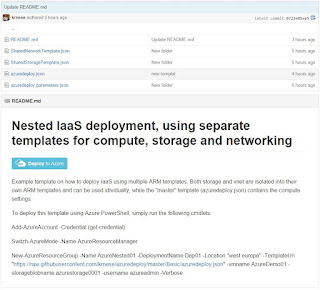This summer, we wrote a whitepaper named «Cloud
Consistency with Azure Resource Manager» that you can download from here: https://gallery.technet.microsoft.com/Cloud-Consistency-with-0b79b775
This whitepaper will soon be updated with new content,
more examples and guidance around best practices for template authoring.
In the meantime I’ve been writing some templates that can
be used by you to learn how you can link templates to have a nested deployment.
The basic example is available on GitHub - https://github.com/krnese/AzureDeploy/tree/master/Basic
You can explore all templates, but in essence I’m doing
the following:
·
Have a dedicated template for storage that takes
some input parameters and can be used separately
·
Have a dedicated template for virtual network
that takes some input parameters and can be used separately
·
Have a master template that also contains
compute, vNic and publicIP resource types that links to the storage and vnet
templates
Again, this is a very easy example and I will provide you
with a more advanced example in a couple of days where we split this up even
further and are able to have a much more flexible and dynamic deployment
scenario around IaaS/PaaS.
Pay attention to the resource section in the
azuredeploy.json document, where we are using the API version “2015-01-01” and
the resource type “Microsoft.Resources/deployments”.
Here I am linking to a public Uri for the template
(hosted on my github) and specify the parameters I’d like to use in my
configuration.
You can hit the “Deploy to Azure” link in order to
explore the json structure in Azure and do an actual deployment.
If you want do deploy it through PowerShell, you can also
see that the “Microsoft.Resources/deployments” resource types are being used.
Happy authoring – and see you next time.




No comments:
Post a Comment